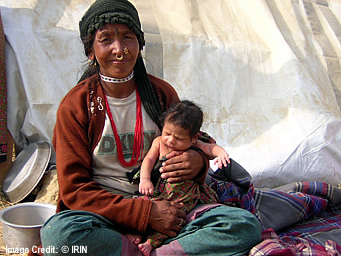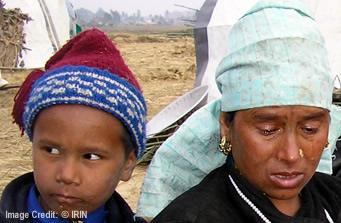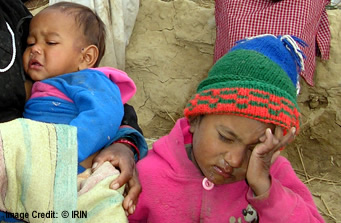|
Nepal
in Crisis 2005: Human Rights
|
|
|
|
Human
Rights and Displaced People
|
|
|
|
UN
official calls for greater assistance for IDPs
|
April
2005 [ This report does not necessarily reflect the views of the United
Nations]
 |
<<
Refugeesat an IDP camp in Rajhena of Nepalgunj
| A
top UN official has called for greater assistance for thousands of internally
displaced persons (IDPs) in Nepal whose suffering remains largely overshadowed
by the nine-year-old Maoist insurgency.
Walter
Kälin, representative of the UN Secretary-General on Human Rights,
said on Friday that many of the displaced people needed protection and
assistance, describing the caseload as "overlooked and neglected".
The
UN official was on a 10-day mission to the country during which he visited
four districts, including a recent hot-spot where actions by 'self-defence'
groups backed by the government, and Maoist retaliation, resulted in over
40 deaths in mid-February. |
|
According
to the UN news service, the UN representative found that there was a widespread
pattern of conflict-induced displacement in the Asian nation, with the
main causes being acts of violence or threats against the population, practices
of forced recruitment and extortion by the Maoist armed group, fear of
reprisals by the Royal Nepal Army for allegedly providing food or shelter
to Maoists (even when this was provided under duress) and a generalised
climate of insecurity.
Kälin
has asked the government of Nepal to condemn the emergence of self-defence
or vigilante groups and to discourage them from taking the law in their
own hands. Additionally, he has requested that government authorities make
adequate arrangements with regard to the protection of IDPs' human rights,
including their proper registration and Document.
 |
<<
Refugees in Nepal: Bacchu Rokaya and her son at an IDP camp in Rajhena
of
Nepalgunj
| Protecting
the voting rights of IDPs was important in the context of the upcoming
municipal elections, which the government planned to hold before mid-April
2006, he added.
The
UN official categorically asked the Communist Party of Nepal (Maoist) to
respect international humanitarian laws, 'particularly the distinction
between combatants and non-combatants'and publicly commit to adhere to
the UN's Guiding Principles on Internal Displacement.
Maoist
violence - which began in February 1996 - and the government's counter-insurgency
operations have resulted in over 11,O00 deaths so far, with that number
growing everyday. |
|
Tens
of thousands of people have been displaced during the conflict, with estimates
ranging from a government figure of 8,000 to up to 200,000 by others.
But
keeping an accurate count of IDPs remains problematic given ongoing issues
of access and registration, and also because many of the displaced had
moved on to India in search of livelihoods.
Nepal
and India share a largely unregulated 1,750-km open border and Kälin
said India could be holding more displaced Nepalese than those that were
in the Himilayan kingdom itself.
Such
a reality points to another problem. Nepal, a nation of some 27 million,
does not have proper camps for the displaced. There are about 100 families
at Rajhena, a camp near Nepalgunj in the Midwestern region of the country.
 |
<<
Bacchu Rokaya's children at an IDP camp in Rajhena of Nepalgunj
| "The
settlement now has small huts, but no schools for children or proper water
supply," Kundan Aryal, general secretary of Informal Sector Service Centre
(INSEC), a local human rights organisation, told IRIN.
"Their
immediate needs are to find ways to survive, send children to school and
keep the youth engaged in productive work," Aryal added. "The longer-term
issues are protection of their property rights and reintegrating them in
society." |
|
INSEC
has also conducted a study on displacement in the east of Nepal, with early
results suggesting those displaced there are either living with relatives
or have found other ways to disperse in the population.
But
their coping mechanisms were nearing exhaustion and according to Kälin,
whatever assistance had been provided to the IDPs remained 'grossly insufficient'.
The
UN official has also called on the international community in Nepal to
develop a comprehensive strategy to respond to the human rights and humanitarian
needs of the IDPs and to find long-term solutions on their behalf.
Credit
and Copyright © IRIN 2005
Integrated
Regional Information Networks (IRIN), part of the UN Office for the Coordination
of Humanitarian Affairs (OCHA).
 |
Full
story ... |

|
|
Refugees
in Nepal: Bacchu Rokaya and her children at an IDP camp in Rajhena of Nepalgunj
|

|







